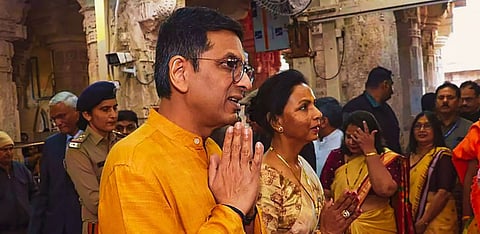

The Chief Justice of India wearing religious symbols might not be the most secular of things in the current context, where these symbols are increasingly becoming totems of provocation, not devotion, argues Amit Sadhukhan.
—
The incumbent Chief Justice of India (CJI)'s recent visit to a religious place, explicitly wearing religiously symbolic attire, especially at a time when the country is politically charged with disharmonious religious sentiments, brings some inherent questions about public probity of eminent citizens, holding the highest constitutional positions, to the fore.
Every citizen— be it the common people or a celebrity— is entitled to demarcate their private and public spheres of life as they deem fit. Visiting places of worship— or in fact, not to visit them— is a fundamental right to liberty.
Ought the CJI's visit to a place of worship, therefore, be simplified just an exercise of individual liberty quite similar to any common citizen or even a popular celebrity?
Moreover, when the CJI's chosen private life of visiting a religious site becomes a public display to the media, where should we locate the problem, if any?
“Ought the CJI's visit to a place of worship, therefore, be simplified just an exercise of individual liberty quite similar to any common citizen or even a popular celebrity?
First, eminent citizens holding constitutional positions are supposed to demarcate between private lives and public matters. There are many cherished examples of probity personified by secularist leadership who brought the very Constitution that the privileged few, among whom is the CJI, are entrusted to vanguard.
Netaji Subhas Chandra Bose was said to be a devotee of Hindu goddess Kali, but refrained from bringing his private faith onto the public bandwagon.
Even if the CJI justifies the visit to a religious place as not necessarily being indicative of any biased views against other religions, the timing or situation within which such visits are being made cannot be indifferent to the public perception.
Did the CJI compromise the words of the oath "I will duly and faithfully and to the best of my ability, knowledge and judgment perform the duties of my office without fear or favour, affection or ill-will and that I will uphold the Constitution and the laws" undertaken for the constitutional position?
Should the CJI not be responsible for moderating his conduct in public based on the general circumstances in the country and the expectations from the constitutional position?
Secondly, the media could not capitalise on a private affair of the CJI's visit to a religious place without the acquiescence of the CJI, who could use protocol to keep the affair private, at least 'of the record' for the media.
Not invoking the protocol at his disposal, the CJI has converted what could have been a private religious affair into an official or public affair. It was bound to create ripples in the communal fabric of this country, given the charged atmosphere we live in. Who knows better than the CJI the forms and content of cases arising from communal tension in recent years?
Last but not least, even if the CJI's visit to a religious place is consciously made into a public affair, it could have been used to pass an unambiguously secular message.
M.K. Gandhi, Rabindranath Tagore and Subhas Chandra Bose were all spiritually inclined but managed a staunchly secular public persona.
Though it could be a difficult topic for a conclusive debate, wearing religious symbols might not be treated as a secular code of conduct, especially when these symbols are increasingly becoming totems of identification of majoritarian communalism and provocation and not devotion.
In October 1921, Subhas Chandra Bose was reluctant to go to Chettiars' Temple in Singapore on the ground that the subordinated castes of Hindu and non-Hindu people were not admitted to the temple.
“Last but not least, even if the CJI's visit to a religious place is consciously made into a public affair, it could have been used to pass an unambiguously secular message.
Upon the insistence of Bose's comrade-in-arms, Abid Hasan, and the temple authority accepting a multi-faith gathering, a national meeting was held at its premises.
Before appearing at the public meeting, Bose wiped the religiously symbolic tilak from his forehead, ritualistically offered from the temple.
Such uncompromising sensitivities with which the national leaders made their appearances to the public should not be left only to gather dust in the historical archives but should be borrowed, especially by the people entrusted to protect and promote secularism as enshrined in the Indian constitution.
Can Indian citizens, therefore, demand the CJI's public probity in upholding secularism not just by constitutional words but in spirit?